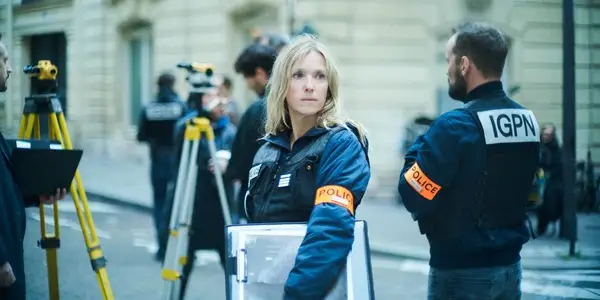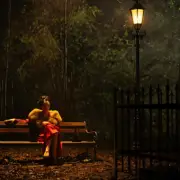Cannes 2025: The Mysterious Gaze of the Flamingo and Case 137

Wilson is a cinema enthusiast based out of Toronto, Canada.…
While The Mysterious Gaze of the Flamingo sees Diego Céspedes returning to Cannes with his first feature (having previously screened his short films at the festvial), Case 137 is another entry from Dominik Moll, who has competed for the Palme d’Or twice before. Both filmmakers return to La Croisette with fictionalized stories about real life issues.
The Mysterious Gaze of the Flamingo (La Misteriosa Mirada Del Flamenco)

Tackling serious subject matter with a sense of brevity can often be challenging, with films of this nature often veering towards being either too light-hearted or serious. With The Mysterious Gaze of the Flamingo, Diego Céspedes seems to have found a good balance in juggling a story depicting the impact of HIV/AIDS in an underdeveloped community through the lens of a young child. Céspedes impresses in his feature directorial debut, and is likely a top contender for this year’s Caméra d’Or prize.
Taking place in the 1980s, a small Chilean town is marred by a mysterious disease that supposedly spreads between men after they fall in love with one another. At the centre of this growing outbreak is the town’s transvestite community, where Flamenco (Matías Catalán) is accosted by a former lover during a local pageant show. With that, Lidia (Tamara Cortés), her daughter, has her life upended and she tries to navigate childhood in a complex and evolving adult world.
Early on, it becomes quite obvious that the film is about the HIV/AIDS epidemic, but framing the ‘plague’ as this ominous entity aligns the narrative with the town’s misinformed viewpoint on the subject. Céspedes draws a clear line in the sand to separate right from wrong, but never overtly belittles the film’s presumed antagonists. In fact, he handles their misgivings with a tenderness that at times doesn’t feel fully deserved, and this level of humility adds nuance to these characters. While the town is foolish in thinking that the disease spreads through the loving gaze of another man, it’s also through a loving and empathetic approach to storytelling that their actions are ultimately rectified.
Céspedes also manages to inject elements of dreamscape innocence through Lidia, who is portrayed with a level of maturity and confidence thanks to Cortés’ strong performance. Lidia’s openness to her chosen family’s way of life serves as the film’s guiding moral compass, making it easier to empathize with the townsfolk, flaws and all. The Mysterious Gaze of the Flamingo might take place in the 1980s, but the story still carries a sense of relevancy with its portrayal of acceptance in the face of misguided hate and disinformation. Céspedes is unflinchingly poignant, yet never heavy handed, in what is ultimately a standout debut effort.
Case 137 (Dossier 137)

Based on true events, Dominik Moll’s latest is a tightly crafted narrative with clear commercial sensibilities. Case 137 (Dossier 137) isn’t overly inventive, but does provide food for thought on the topic of police brutality through its efficient storytelling. Nothing outstanding here, but the film will likely be entertaining enough for the masses.
Set in 2018, a young boy is injured during France’s infamous yellow vests protests. Local inspector Stephanie Bertrand (Léa Drucker) is tasked with investigating the circumstances around this injury, which was alleged to have been inflicted by local police officers. Working within this internal affairs department, Stéphanie receives heat from her colleagues, many of whom think she’s on the wrong side of the aisle.
As a piece of expository narrative filmmaking, Case 137 flows with efficiency and is paced with a sense of urgency that matches the case being depicted. Moll is able to convey procedural jargon quite effortlessly, creating an entertaining flow of narration that never loses its rhythm. But this efficiency in storytelling leaves less room for dramatic exploration, rendering the film’s more emotional beats not nearly as impactful. Even during depictions of brutality, the focus is always on the legality and logistics of the case, rather than its underlying humanity. This creative choice results in a much tighter film, but seeing as it also never fully becomes a litigating courtroom drama, deviating from the investigative nature of the case would’ve been an appropriation direction as well.
And while the film does try to unravel Stéphanie’s inner conflict surrounding her loyalties to those on the force, much of this is left for the film’s closing moments. There’s also sprinkles of Stéphanie’s domestic life, which again, feel cursory to the more procedural elements of the story. There simply isn’t enough dramatic realizations to anchor the film’s emotional core, leaving a void that yearns to be filled. But perhaps this was never the intention of the film, and Moll simply wanted to create a story that focuses more on the system, rather than its people. A more humanistic approach would have resulted in a much better film, but as it stands, Dossier 137 will likely still have enough appeal to local audiences familiar with the 2018 protests.
Does content like this matter to you?
Become a Member and support film journalism. Unlock access to all of Film Inquiry`s great articles. Join a community of like-minded readers who are passionate about cinema - get access to our private members Network, give back to independent filmmakers, and more.
Wilson is a cinema enthusiast based out of Toronto, Canada. He escapes from his day job by writing random thoughts about cinema on the internet. Although he has a longstanding penchant for Hong Kong cinema, he considers himself to be an advocate for Asian cinema in general. He has been attending the Toronto International Film Festival every year since 2005, and more of his work can be found on his website: www.wilson-kwong.com.













